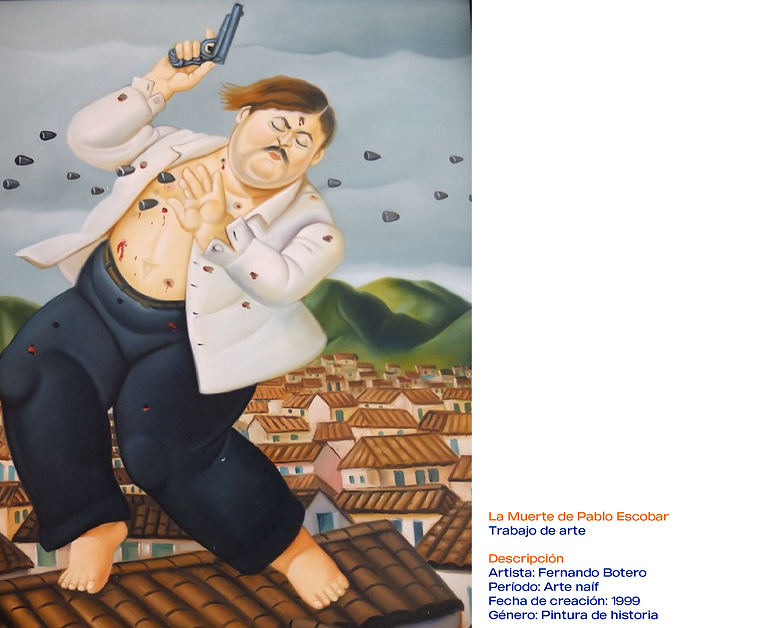
Entrada 2:
Colombia beyond Narco culture
Throughout my experience working as a Spanish teacher for foreigners, many of my students, and so many other tourists who have not been in my classes, have asked me about Pablo Escobar, drugs and narco culture in Colombia.
It is a fairly common question within foreigners who visit our country for the first time, or those who have not had the opportunity to know the wonders of this territory. This question for many Colombians is a rather sensitive subject, either because they lived first-hand the violence in our country or out of shame of nominating a man who has become an icon worldwide, which is almost synonymous with reference thanks to commercial series that have exploited the image of this character. I almost always answer the same: "'Pablo Escobar is an icon, a nefarious man and villain, although for many people he can be known as a hero (or antihero) a character to admire thanks to the ignorance of the history. It's part of our reality, that's undeniable. We must know and recognize that it existed and that even its actions continue to impact and affect the progress of our society.''
I always try to explain that Colombia has multiple realities, points of view and visions of things thanks to the different forms of life that we as Colombians have, where the rate of social inequality is even sad to recognize.
Despite our history that has had more than 100 years of violence, which since its inception was marked by dissent and inequality, our country is a country of survivors from its foundations. We have a history of survival of ancestral peoples, indigenous languages and multicultural forms in our territory. A story to be proud of being Colombian. We are defined by resilience, because we are a country that even having multiple challenges to face as a society has had great icons in sport, international music, science and technology and even literature.
We are a multicultural country, full of friendly faces and honest people, a country that, despite being famous for drug trafficking, has worked unstoppable to get out of that reality, with mothers and fathers who fight day by day for their children, with people who help those who need it and, above all, with people who despite social and economic inequality have come forward and achieved great things.
Colombia beyond the narco culture we are all, we are that indigenous who has survived the historical colonization that has made them strong, we are that Afro population that day by day fights against violence in their territories and works for the construction of their region, their people, their neighborhood, we are a country full of children who despite being born in poverty, are fill with art, music and love to succeed, we are a country full of old people who, although they do not have to eat or sleep, go out of their way fighting and working. We are a country of musicians, artists, teachers, students, people who believe in a better society and fight for it because we know that one day our country will never again be called the country of Pablo Escobar, but the country that went ahead with effort and struggle and the word ''drug trafficking'' will never again define us and be replaced by the words ''Perseverance'' 'goodness', ''love''.
Entrada 1:
Cómo aprender español de forma fácil y divertida
Seguramente te estarás preguntando cómo aprender español de forma rápida, fácil y divertida. A pesar de que no existe una fórmula mágica o una inyección en la que el idioma pueda entrar directamente a tu cerebro, sí existen formas diferentes de hacer el aprendizaje del español divertido e interesante y sobre todo que tu cerebro se sienta motivado.
Pero ¿Cómo hacerlo?
Desde que empecé a enseñar español noté un factor común entre las personas que aprenden más rápido y noté que todos ellos tenían un interés particular o una necesidad de aprender el idioma. ¿Cuál era ese interés particular? Muchos de ellos estaban viajando por Centro y Suramérica y necesitaban el idioma para poder comunicarse, manteniendo una motivación que crecía mientras ellos iban aprendiendo no solo gramática (lo cual si bien es un componente importante no es el principal) sino también iban adentrándose en la cultura con música, contacto constante con personas que hablan español y a su vez con arte, comida.
Las malas prácticas dentro del aprendizaje son comunes, tales como hacer una clase magistral en la que los estudiantes solamente aprendan gramática y no tenga la oportunidad de procesar su conocimiento y tener un contacto REAL y directo con la cultura. En tus primeros años tus padres nunca tuvieron la necesidad de enseñarte conceptos gramaticales, sino que por la necesidad de comunicarte y por la interacción constante que ellos tenían contigo el idioma se metió en tu cerebro de una forma natural.
Así debe ser el aprendizaje del español, debe ser natural, ser divertido, interactivo y sobre todo generar interés en el estudiante.
En Muntú nos enfocamos en enseñar español con diferentes formas pragmáticas en las que el estudiante se verá interesado en aprender información nueva sobre diferentes culturas en Latinoamérica y sobre todo tenemos un enfoque altamente cultural con el cual se podrá interactuar con hablantes nativos del español los cuales no serán solamente profesores sino también motivadores que buscarán dependiendo de cuál sea tu interés y tus necesidades con respecto al español adaptar cada lección para que conozcas, te diviertas y disfrutes de aprender español por medio de música que será recomendada constantemente para ampliar vocabulario, películas, comida y cultura que te harán no solo aprender español sino empezar un viaje en cada clase que tomes con nosotros.
Con Muntú vive la experiencia y amplia tus horizontes.




